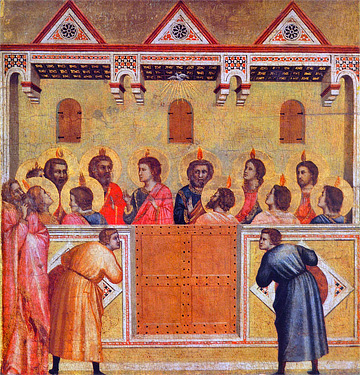My last post in this series began to answer the question:
So, then, what difference does it make for us today that the first Christians were filled with the Holy Spirit almost two millennia ago on the Jewish festival of Pentecost?
I suggested two ways that Pentecost makes a difference today:
1. Pentecost underscores the presence and power of the Spirit, thus inviting us to be open to the Spirit’s work in and through us.
2. Pentecost illustrates the centrality of the church in God’s work in the world, thus encouraging us to recommit ourselves to being an active part of the body of Christ.
Today I’ll offer two more answers to the question: Why does Pentecost matter?
3. The Multilingual Nature and Mission of the Church
 On Pentecost, the Holy Spirit empowered believers in Jesus to praise God in many languages that they had not learned in the ordinary manner (Acts 2:5-13). Symbolically, this miracle reinforces the multilingual, multicultural, multiracial mission of the church. We are to be a community in which all people are drawn together by God’s love in Christ. As Paul writes in Galatians 3:28: “There is no longer Jew or Greek, there is no longer slave or free, there is no longer male and female; for all of you are one in Christ Jesus.” (Photo: “Pentecost” by Giotto di Bondone, 1320-25, National Gallery, London.)
On Pentecost, the Holy Spirit empowered believers in Jesus to praise God in many languages that they had not learned in the ordinary manner (Acts 2:5-13). Symbolically, this miracle reinforces the multilingual, multicultural, multiracial mission of the church. We are to be a community in which all people are drawn together by God’s love in Christ. As Paul writes in Galatians 3:28: “There is no longer Jew or Greek, there is no longer slave or free, there is no longer male and female; for all of you are one in Christ Jesus.” (Photo: “Pentecost” by Giotto di Bondone, 1320-25, National Gallery, London.)
Personal Implications: Although there are some glorious exceptions, it seems that the church has not, in general, lived out its multilingual mission. We are often divided according to language, race, and ethnicity. Pentecost challenges all of us to examine our own attitudes in the regard, to reject and repent of any prejudice that lurks within us, and to open our hearts to all people, even and especially those who do not share our language and culture. Yes, I know this is not easy. But it is central to our calling. And it is something that the Spirit of God will help us to do if we are available.
4. The Inclusive Ministry of the Church
After the Holy Spirit fell upon the first followers of Jesus, Peter preached a sermon to help folks understand what had just happened. In this sermon he cited a portion of a prophecy from Joel:
‘In the last days,’ God says,
‘I will pour out my Spirit upon all people.
Your sons and daughters will prophesy.
Your young men will see visions,
and your old men will dream dreams.
In those days I will pour out my Spirit
even on my servants–men and women alike–
and they will prophesy. (Acts 2:17-18; Joel 2:28-29)
Later, Peter explained that the Spirit would be given to all who turned from their sin and turned to God through Jesus (Acts 2:38).
This was a momentous, watershed event. For the first time in history, God began to do what he had promised through Joel, empowering all different sorts of people for ministry. Whereas in the era of the Old Testament, the Spirit was poured out almost exclusively on prophets, priests, and kings, in the age of the New Testament, the Spirit would be given to “all people.” All would be empowered to minister regardless of their gender, age, or social position.
Although this truth would not mean that every Christian would be gifted for every kind of ministry, it did imply that all believers would be empowered by the Spirit. The church of Jesus Christ would be a place where every single person matters, where every member contributes to the health and mission of the church (see Eph 4:11-16).
Personal Implications: Each Christian needs to ask: Am I serving God through the power of the Spirit? Am I exercising the gifts of the Spirit in my life, both in the gathered church and as I live for God in the world? Pentecost is a time to ask God to fill us afresh with the Spirit so that we might join in the ministry of Christ with gusto. And it is a time to renew our commitment to fulfilling our crucial role in the ministry of God’s people in the world.
Moreover, those of us who hold positions of power in the church should examine our attitudes and actions. Are we encouraging all of God’s people to minister through the power of the Spirit? Are we open to what the Spirit of God wants to do in our churches and communities through his empowered people? Or are we gatekeepers of the church who would even keep the Holy Spirit out of our carefully tended and controlled communities? As a pastor, my role is to equip God’s people for doing the ministry of Christ in the church and the world (Eph 4:11-12). Sometimes, however, we pastors are so concerned about our own position and power that we fall short of this central pastoral calling. Pentecost is a day for pastors and other church leaders to recommit to equipping and encouraging all Christians for their ministry. When we do this, the Holy Spirit will be free to use the church of Jesus Christ for God’s purposes in the world.

